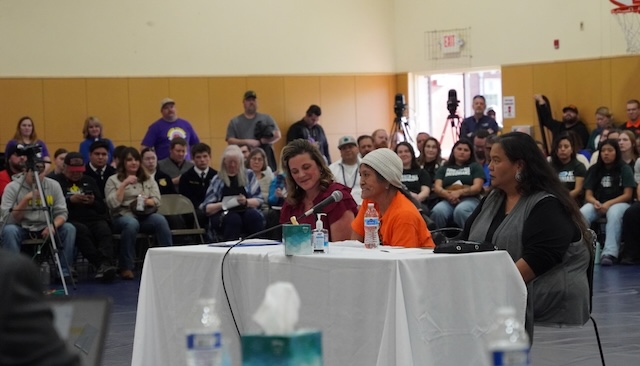In Warm Springs, tribal members and other Central Oregon residents share budget feedback
Published 8:52 am Thursday, April 10, 2025

- Warm Springs elder Linda Meanus, who graduated from college at 65, urges lawmakers to prioritize measures to support students on April 4. (Julia Shumway/Oregon Capital Chronicle)
WARM SPRINGS— Oregonians aren’t supposed to clap — or cheer, boo, hiss or stomp their feet — at legislative hearings. But there was no containing the applause in the old school gym that served as a hearing room on Friday night when Louie Pitt Jr. finished his two minutes of testimony.
Pitt, a former director of government affairs and planning for the Confederated Tribes of Warm Springs, thanked lawmakers on the budget-writing Joint Ways and Means Committee for work on laws to investigate the deaths and disappearances of Indigenous people, and said tribal members and their neighbors in Central Oregon still need help accessing clean drinking water and affordable housing.
Pitt closed with a welcome — and a reminder.
“Welcome to Indian Country,” he said. “It’s all Indian Country, of course.”
Friday night’s hearing at the old Warm Springs elementary school, one of a half-dozen hearings throughout the state for lawmakers to hear community feedback as they craft the state’s budget, was the first since at least 2005 to be held on tribal land. Other visits this year are to Gresham, Astoria, La Grande and Klamath Falls, while a hearing in Salem next week will prioritize virtual testimony from Oregonians who couldn’t attend an in-person event.
Ensuring at least one of the traveling hearings was on tribal land was especially important to Rep. Tawna Sanchez, a Portland Democrat who is of Shoshone-Bannock, Ute, and Carrizo descent and the second Indigenous person elected to the Oregon Legislature. Before entering elected office, she co-founded the Native American Youth and Family Center, or NAYA, in Portland and spent years advocating on Indigenous issues.
Sen. Kate Lieber, a Beaverton Democrat who co-chairs the committee with Sanchez, told the Capital Chronicle she and Sanchez looked over the past two decades worth of hearings to decide where to visit.
“We knew we needed to come to Central Oregon, and of course everybody thinks of that as the Bend or Redmond area, but we really wanted to make sure that we included Warm Springs, especially given Representative Sanchez’s heritage,” she said. “So we decided to come to Warm Springs because we realized we’d never done it on tribal land before.”
Ray Moody, the tribes’ vice chair, prayed over the start of the hearing and told lawmakers he hoped they understood just how far they drove on the tribes’ homelands, both the 644,000 acres of the reservation and the millions of acres members of the Warm Springs, Wasco and Paiute bands ceded to the federal government with an 1855 treaty.
“We hope that you understand our reach, not only through our own boundary but the land that we call ceded territory, over 10 million acres, that the things you do in the state affect us all the time,” Moody said. “Our people are very humble and it is often hard to come to ask for assistance, but we will come to you when we need to. We will ask you, and we appreciate those who work hard to help us.”
About one-fifth of the roughly five dozen people who spoke during the two-hour hearing were members of the Warm Springs tribes, while others traveled from Central Oregon cities including Bend, Redmond, Madras, Prineville.
Nearly all of them came with specific requests for government spending on projects and programs that would far outpace the state’s resources as laid out in a $38 billion budget framework Sanchez and Lieber released last month. Most of their budget rough draft reflects continuing current programs, with $987.5 million available for additional spending — assuming proposals to cut federal spending responsible for about one-third of the state budget don’t come to pass.
“In our framework, we have just under a billion dollars to invest, $987 million,” Sanchez said at the end of the hearing. “And if everyone was listening carefully, and I was trying to, there are multiple billions of dollars being asked for. Every single one of those asks are worthy and important, and we will do our best.”
After a fire season that burned a record-breaking 1.9 million acres, much of it in eastern Oregon grassland, Crook County Commissioner Seth Crawford urged lawmakers to pass House Bills 3349 and 3350, creating a new fund for rangeland protection with at least $1 million in the next budget.
Prineville Council President Steve Uffelman said the city needs about $12 million for safety-related upgrades on U.S. Highway 26. And Redmond City Councilor Kathryn Osborne said her city wants about $1.5 to $2 million from the state to join a $500,000 investment from the city to add a traffic light at an intersection that has seen 260 car crashes, two of them fatal, in the past eight years.
Warm Springs elder Linda Meanus urged lawmakers to support House Bills 3182 and 3183, which would provide more than $16 million for affordable housing for college students and $2 million for textbooks and education resources.
Meanus started college at age 61 and graduated from Portland State University in 2016 at 65. She relied on tribal grants and scholarships to pay for school, which left her little money for rent, bills or groceries.
“I am here to tell you that the future of the tribe’s in your hands,” she said. “Many of the Warm Springs kids will need access to food, housing and textbooks. The student basic needs bills will make it much easier for the students to graduate.”
Elizabeth Johnson, a public health nurse, urged Oregon lawmakers to keep funding health care in the face of potential federal cuts.
“Actions from the White House are only benefiting the mega-wealthy, but for Oregonians like myself, the family I support and my community, they mean job loss, loss of stability and are wreaking havoc on my ability to do my job, which is to prevent infectious diseases,” she said. “Oregon must continue to hold the line on making unnecessary cuts to Medicaid and public health based on what might happen in Washington, D.C.”
Madras resident Robyn Morrison asked lawmakers to keep in mind the big picture of climate change while making their budget decisions. Morrison, who moved from Montana to Madras to be closer to family, said her grandchildren are anxious about the climate crisis and that her generation hasn’t done enough to block it.
“We cannot allow the tyranny of the present to distract us from our children’s future,” she said.
Former Oregon poet laureate Elizabeth Woody, now the executive director of the Museum at Warm Springs, urged support of the $8.9 million in grants to cultural organizations in House Bill 3191. The Museum at Warm Springs, which opened in 1993, would receive $1.5 million under that proposal.
“We provide a gateway to think about this land in a different way,” Woody said.







